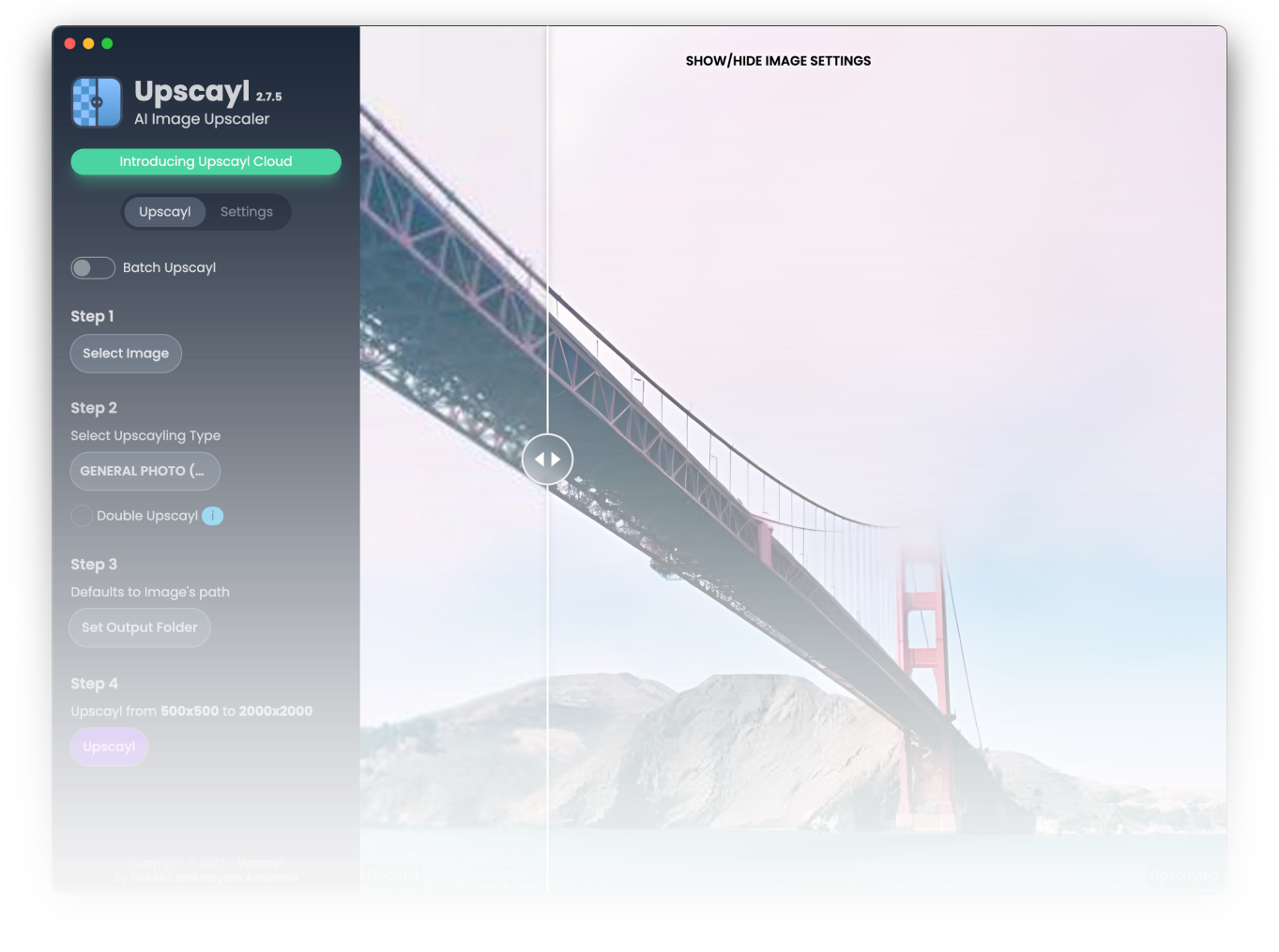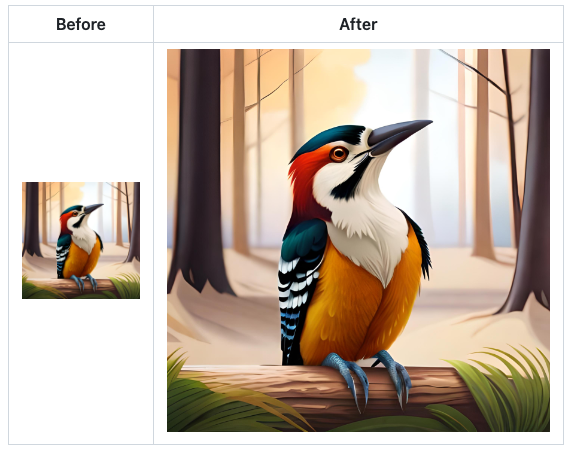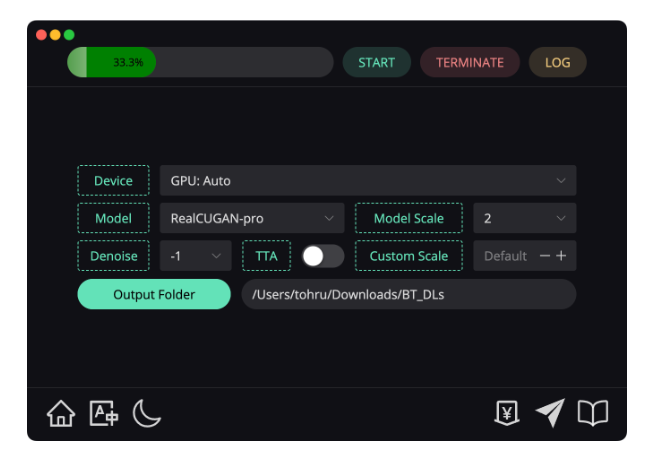14 Free Image Upscaling Apps to Enhance Low-Resolution Images with AI Technology
Table of Content
Image upscaling is the process of increasing the resolution and quality of low-resolution images. It is an important technique as it allows for the enhancement of image details and sharpness, resulting in visually appealing and high-quality images.
With the advancement of AI technology, image upscaling can now be done using AI algorithms, which have shown remarkable capabilities in accurately predicting missing image details and producing realistic and improved results.
Benefits of image upscaling
The use of AI in image upscaling brings several benefits.
Firstly, it enables the upscaling of images without compromising quality, preserving important details and textures. AI algorithms can analyze the patterns and structures in low-resolution images and generate high-resolution counterparts that closely resemble the original content.
Secondly, AI-powered upscaling can be performed in bulk, allowing for the efficient enhancement of multiple images simultaneously. This saves time and effort for users dealing with large volumes of images.
Lastly, AI image upscaling can be a self-hosted solution, ensuring data privacy and security by allowing users to process their images locally without relying on cloud-based services.
Use-cases
The applications and use-cases of image upscaling using AI are diverse:
1- Content creators and Marketeers
Content creators can utilize it to enhance the quality of images for websites, social media, and presentations, making their visual content more appealing.
2- eCommerce
eCommerce businesses can benefit from AI upscaling by improving the visual quality of product images, which can lead to increased customer engagement and sales. Artists and designers can leverage AI upscaling to transform low-resolution images into high-quality artwork and designs.
3- Photographers
Additionally, photographers can enhance the quality of their images, improving their overall visual impact and making them more suitable for printing or display.
Using AI for Image Upscaling
Image upscaling using AI works by training deep learning models on large datasets of high-resolution images. These models learn to understand the relationships between low-resolution and high-resolution image patches.
When presented with a new low-resolution image, the trained model predicts the missing details based on the learned patterns. AI algorithms employ sophisticated techniques such as convolutional neural networks (CNNs) and generative adversarial networks (GANs) to generate high-resolution images that closely resemble the original content.
The process involves analyzing the image at different levels, extracting features, and synthesizing new image details to create a visually enhanced output.
1- Qualityscaler (Windows)

Qualityscaler is a powerful Windows application that utilizes BSRGAN AI to confidently enhance, enlarge, and effectively reduce noise in both photos and videos. This advanced tool is implemented in Python, showcasing its versatility.
It offers exceptional features such as image and video upscaling, seamless drag and drop functionality, automated tiling and merging of images, intelligent resizing prior to upscaling, and robust support for multiple GPUs.
The application seamlessly handles a wide range of image formats including png, jpeg, bmp, webp, and tif, while also supporting popular video formats such as mp4, webm, gif, mkv, flv, avi, mov, and qt.
The app is available to download thru GitHub, Itch.io, and Steam.
Features
- Easy to use GUI
- Images and Videos upscale
- Multiple AI models
- Automatic image tiling and merging to avoid gpu VRAM limitation
- Resize image/video before AI upscaling
- Interpolation between the original and upscaled image/video
- Multiple Gpu support
- Compatible images - png, jpeg, bmp, webp, tif
- Compatible video - mp4, wemb, gif, mkv, flv, avi, mov, qt
Requirements.
- Windows 11 / Windows 10
- RAM >= 8Gb
- Any Directx12 compatible GPU with >= 4GB VRAM
2- Upscayl

Upscayl is a free and open-source AI image upscaler for Linux, MacOS, and Windows. It prioritizes Linux builds but also supports other operating systems.
It requires a Vulkan-compatible GPU for image upscaling and uses AI models like Real-ESRGAN. The CLI tool, real-esrgan-ncnn-vulkan, is available on the Real-ESRGAN repository.
3- Upscaler
Holloway's Upscaler is a CLI-friendly image and video upscaling program that consolidates various open-source AI upscaling products. It offers low-cost AI upscaling software that can be run locally, programmability for album or video upscaling, and reliable performance for handling large video files.
4- RealScaler (Windows)

RealScaler is a Windows app that utilizes RealESRGAN AI to enhance, enlarge, and reduce noise in photos and videos. It is written in Python and uses external packages such as torch, customtkinter, openCV, moviepy, and pyinstaller.
The app is available to be installed using Itch.io.
Features
- Easy to use GUI
- Images and Videos upscale
- Multiple AI models
- Automatic image tiling and merging to avoid gpu VRAM limitation
- Resize image/video before AI upscaling
- Interpolation between the original and upscaled image/video
- Multiple Gpu support
- Compatible images - png, jpeg, bmp, webp, tif
- Compatible video - mp4, wemb, gif, mkv, flv, avi, mov, qt
5- μScale

μScale or MicroScale is an open-source image upscaler built for the first TheFullstack hackathon (Next.js / Replicate).
6- SuperImage (Android)
SuperImage is this awesome AI-powered app for Android that takes your low-resolution pictures and makes them look super sharp and clear. And guess what? It does all of this right on your device, so your images stay safe and secure without being uploaded to the internet.
To use the app, make sure your device supports Vulkan or OpenCL and you're running Android 7 or a newer version.
Features
- Sharpen your low-resolution pictures
- The input image is processed in tiles on the device GPU
- SuperImage is a neural network based image upscaling application
- For Android
- Uses a pre-trained Real-ESRGAN model
- This application requires Vulkan or OpenCL support
7- Upscale
This program upscales any image by a factor of 2 using cubic interpolation algorithm. To run the program, you may need to install the libraries tqdm, itertools, and OpenCV.
Features
- Upscale any image by a factor 2
- C++ variant of the programm to improve speed and efficiency
- Different factor from 2 (may be downscalling the image ?)
- Multi threading (in python and C++ if I manage to program this project in C++)
- Uses an algorithm of cubic interpolation
8- PNG Upscale
This is a free small tool that uses pretrained models to upscale images using AI super resolution. It is available for Windows, Linux, and macOS.
9- UltraScaler (Windows)

UltraScaler confidently offers an exceptional AI image upscaler software capable of scaling images up to 5x without any compromise on quality.
Developed to cater to the growing need for high-resolution images in the market, UltraScaler excels in enabling bulk upscaling of AI-generated images for seamless sale on stock websites.
It effectively overcomes the speed and automation limitations faced by other AI image generators.
10- ImageUpscaler

ImageUpscaler is a self-hosted web app that uses AI image upscaling technology to transform low-resolution images into high-quality masterpieces with 4x upscaling. It enhances image details and sharpness, allowing you to elevate your visual content and impress your audience.
11- Image Super-Resolution (ISR)
The Image Super-Resolution (ISR) project aims to upscale and enhance the quality of low-resolution images. It provides Keras implementations of Residual Dense Networks for Single Image Super-Resolution, along with training scripts using content and adversarial loss components.
It includes Docker scripts, Google Colab notebooks, and AWS/Nvidia-docker training scripts are available.
The recommended training process involves starting with PSNR loss and gradually introducing GANS and feature loss. ISR is compatible with Python 3.6 and distributed under the Apache 2.0 license.
12- Avir
AVIR is a high-quality pro HDR image resizing/scaling C++ library that utilizes a fast SIMD Lanczos resizer. The algorithm upsizes the image by 2X and then performs interpolation using sinc function-based fractional delay filters. A correction filter is applied to fix any smoothing introduced in previous steps.
13- Final2x

This is a powerful tool that allows for image super-resolution to arbitrary sizes using multiple models, designed to enhance the resolution and quality of images, making them clearer and more detailed. Presently, it supports several models, such as RealCUGAN, RealESRGAN, Waifu2x, and SRMD.
Key Features
- Cross-platform: The tool is available for Windows x64/arm64, MacOS x64/arm64, and Linux x64, allowing users to enjoy the benefits of super-resolution regardless of their operating system.
- Super-resolution: The tool employs advanced algorithms and models to upscale images, significantly increasing their resolution without sacrificing quality.
- Multiple models: It offers a wide range of models that can be used to achieve different levels of super-resolution, allowing users to choose the one that best suits their specific needs.
- Customizable Scale: Users have the flexibility to specify the desired output size for their images, ranging from small enhancements to large-scale super-resolution.
- i18n: The tool is available in English, Chinese, and Japanese, allowing users from different countries to enjoy the benefits of super-resolution.
14- Scapix

Scapix is an app developed with sveltekit, electron, waifu2x and esrgan. It's made to denoise/upscale images, gifs, videos locally on your computer.
Conclusion
In summary, image upscaling using AI is an essential technique for enhancing the quality of low-resolution images. It offers benefits such as high-quality upscaling, bulk processing, data privacy, and security.
Various industries and creative endeavors can benefit from AI upscaling, including content creation, e-commerce, art and design, and photography.
AI-powered upscaling works by training models on high-resolution images and using them to predict missing details in low-resolution images, resulting in visually appealing and realistic outputs.












